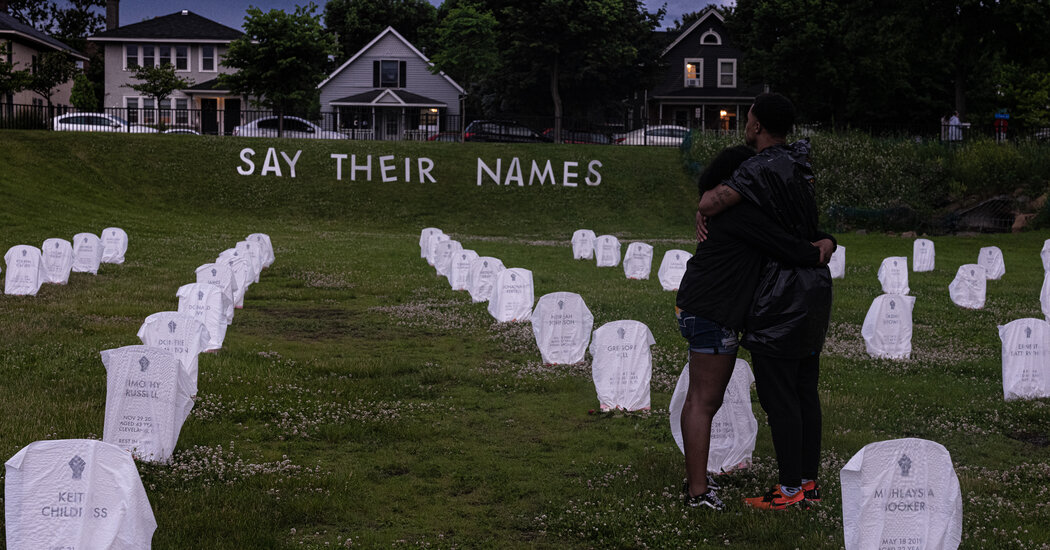Despite Uproar Over Floyd’s Death, an Unceasing Tide of Police Killings
George Floyd’s murder set in motion shock waves that touched almost every aspect of American society. But on the core issues of police violence and accountability, very little has changed.For the second time this year, a jury in Minneapolis has ruled against a former police officer for killing a Black man.Like the conviction of Derek Chauvin for the murder of George Floyd, the verdict on Thursday against Kimberly Potter on two counts of manslaughter for the shooting death of Daunte Wright during a traffic stop represented an unusual decision to send a police officer to prison.And yet, despite the two high-profile convictions in Minneapolis, a review of the data a year and a half after America’s summer of protest shows that accountability for officers who kill remains elusive and that the sheer numbers of police killings have remained steady at an alarming level.The murder of Mr. Floyd on a Minneapolis street corner drew millions to the streets in protest and set off a national reassessment on race that touched almost every aspect of American life, from corporate boardrooms to sports nicknames. But on the core issues that set off the social unrest in the first place — police violence and accountability — very little has changed.Since Mr. Floyd’s death in May of last year, 1,646 people have been killed by the police, or about three people per day on average, according to Mapping Police Violence, a nonprofit that tracks police killings. Although murder or manslaughter charges against officers have increased this year, criminal charges, much less convictions, remain exceptionally rare.That underscores both the benefit of the doubt usually accorded law officers who are often making life-or-death decisions in a split second and the way the law and the power of police unions often protect officers, say activists and legal experts.Daunte Wright’s death at the hands of a police officer in Brooklyn Center, a Minneapolis suburb, set off new rounds of protests in April.Victor J. Blue for The New York TimesThe convictions of both Mr. Chauvin, the former Minneapolis officer who was captured on an excruciating bystander video pinning Mr. Floyd to the ground for more than nine minutes as he gasped for air, and Ms. Potter strike some experts as tantalizing glimpses of a legal system in flux. Ms. Potter’s case, in particular, reflected the kind of split-second decision — she mistakenly used her gun instead of her Taser after Mr. Wright tried to flee an arrest — that jurors usually excuse even when something goes horribly wrong.Chris Uggen, a sociology and law professor at the University of Minnesota, said that even though police killings remained prevalent, high-profile cases could still send a message to the police. “The probability of punishment is not zero,” he said. “So it moves the needle to some degree, and it can certainly affect the behaviors of police officers.”But many experts are reluctant to read too much into a few isolated cases carried out in the glare of media scrutiny.“Criminal trials are not designed to be instruments of change,” said Paul Butler, a professor at Georgetown University Law Center and a former prosecutor. “Criminal trials are about bringing individual wrongdoers to justice. So while there have been high-profile prosecutions of police officers for killing Black people, that doesn’t in and of itself lead to the kind of systemic reform that might reduce police violence.”Philip M. Stinson, a criminal justice professor at Bowling Green State University in Ohio, who tracks police criminal charges and convictions, said Ms. Potter was the first female police officer convicted of a murder or manslaughter charge in an on-duty shooting since 2005. He said he believed that the number of deaths from excessive police force was higher than what was recorded and reflected in news coverage.“Many police officers exhibit a fear of Black people,” he said. “Until we can address that, it is very difficult to bring about meaningful reforms.”Gloria J. Browne-Marshall, a constitutional law professor at John Jay College of Criminal Justice in New York, said accountability also needed to be aimed at prosecutors who gave officers “carte blanche” for a century until the recent show of public outrage. Change is not likely to come soon, she said.“In these individual cases, justice won in the end,” she said. “But there is a lot of work that still needs to be done.”In fact, there has been no finding of fault against officers in many of the other recent high-profile police killings.Less than three weeks after the murder of Mr. Floyd, an officer in Atlanta fatally shot a Black man named Rayshard Brooks, who was fleeing a Wendy’s parking lot after taking a Taser from the officer’s partner and firing it at him. The killing in Atlanta, like that of Mr. Floyd’s, was captured on bystander video and drew protesters, adding to the demands for justice and accountability over the number of African Americans killed by the police. Breonna Taylor was killed in her Louisville apartment during a botched police raid targeting her ex-boyfriend.Xavier Burrell for The New York TimesAnd about two months before Mr. Floyd’s murder, Breonna Taylor was killed in her Louisville apartment during a botched police raid that targeted an ex-boyfriend for alleged drug crimes. Her name, too, became familiar to millions of Americans.Yet the officers involved in the Taylor case have largely been cleared, even as federal authorities continue to investigate. And in Atlanta, Mr. Brooks’s case stalled this summer as it was passed to a third prosecutor, who is starting the investigation all over again. The officer who shot Mr. Brooks has been charged with murder, but there is no timeline for a trial.“We are taking a fresh look at it and starting from Day 1,” said Pete Skandalakis, the special prosecutor in Georgia who took over the case. He added that he could not predict when the case would see a courtroom.Understand the Killing of Daunte WrightCard 1 of 5The trial.

